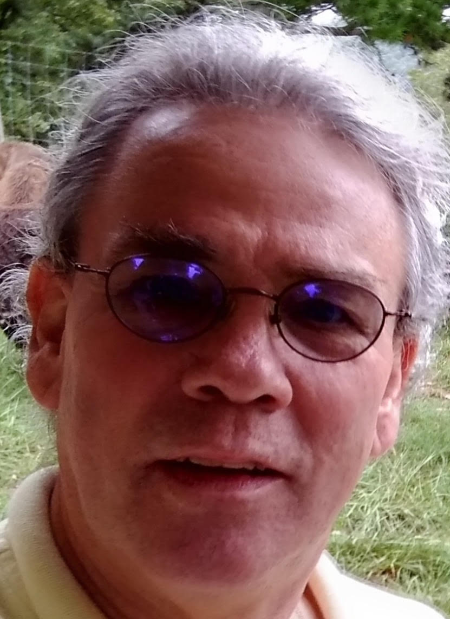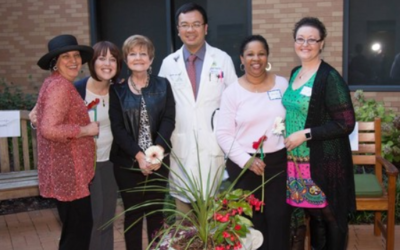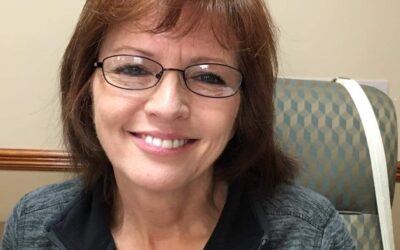| Hello, my name is Dale Tarrant and I currently live in Anderson, South Carolina.
I am a US Navy and Army National Guard Veteran. My story begins in late September – early October of 2014. I was 53 years old at the time and had been experiencing some abdominal pain for a quite some time. Several weeks maybe longer. I decided to schedule an appointment to see a gastroenterologist. The Doctor examined me and asked if I had ever had an EDG (upper GI) before. I said no I’ve never had that before. The doctor recommended that I have it so a proper diagnosis can be made. The procedure was scheduled and performed around middle of October and after about 2 weeks, I was notified about the results. The endoscopy revealed that I had what they called at the time, a carcinoid tumor in my stomach. Carcinoid tumors are a type of slow-growing cancer that can arise in several places throughout your body, which are one subset of tumors called neuroendocrine tumors, which usually begin in the digestive tract (stomach, appendix, small intestine, colon, rectum) or even in the lungs. My Gastroenterologist at that time wanted me to undergo another endoscopy to try to remove this tumor internally. However, it was unsuccessful due to the tumor being embedded too deep in the lining of the stomach wall. It was then recommended that I go and see an Oncologist Surgeon for further observation. After my first visit with the Oncologist Surgeon, he schedules a CT Scan w/ contrasts and a nuclear radiation scan. The tumor was shown to be in the lower middle of my stomach. The Oncologist Surgeon discussed the type of surgery he could perform by doing a Laparoscopic Partial Wedge Gastrectomy. There was no mention of any type of treatment such as chemotherapy or radiation treatment. The surgery was scheduled for Dec. 3, 2014. All the necessary blood work was done before and after the surgery. After the surgery and recovery time of several weeks, I returned to work thinking, that was the end of my cancer and that everything is fine now. I was told that I would have to undergo an endoscopy every year for the rest of my life, to keep a check on any re-occurrences. For over 4 and a half years, I went on living my life without much worry, because I was pretty much convinced and certain that all the cancer was gone. Even though, in the back of my mind I was not totally sure of that! Since that time, I started seeing a different Gastroenterologist doctor and he was very much aware of my past health condition. For the first 3 ½ years after my Partial Wedge Gastrectomy surgery, things seem to be ok. Only a few minor polyps where found and biopsied with no signs of cancer or any major concerns. Then January 12, 2019 arrived, and it was once again time for me to have the yearly endoscopy. It was also time for me to have what everyone dreads to have. That’s right! The ole dreaded colonoscopy. Everyone who has ever had a colonoscopy knows that the prep for this procedure is as bout as fun as jumping into a pit full of snakes. It’s no fun at all. The Endoscopy was performed first and then the Colonoscopy was performed. Let me say, I’ve never had a doctor to personally call me with any type of report of prognosis. It’s always been a nurse or some other assistant. But my doctor called me just a few days after he sent some biopsy’s to pathology, to tell me that he didn’t like what he saw and what the report said. He said it was inconclusive. He wanted me to wait 6 more months and have the endoscopy again. On July 12, 2019 I went to the hospital for my 2nd endoscopy for the year. After the pathology report was received, he then ordered a blood Gastrin test, which checks for excess gastrin levels. Gastrin is a hormone that your stomach makes to fuel the release of gastric acid. Your body needs this to digest and absorb nutrients in your food, particularly proteins and amino acids. … Gastric acid is found inside cells called G cells standard range of less than or equal to <=100 pg/mil My value was 597 pg/mL. This arose more concern and suggested that I see an Oncologist for further observation and to schedule an ultrasound endoscopy with a specialist. The first visit with a different oncologist was nothing more than reviewing my past medical history and then sending me for more blood test. Now these blood test also included a Chromogranin A blood test. I never knew or understood what this was. It’s a Comprehensive Geriatric Assessment (CGA) which is a multidisciplinary process to evaluate the medical, functional, psychiatric, and social strengths and limitations in older patients. CGA provides a focus on the interrelated factors that contribute to illness. CGA improves survival and decreases the frequency of acute care hospitalization. Chromogranin A is a protein released from neuroendocrine cells. These are cells that secrete hormones in response to signals from the nervous system. They are found in organs throughout the body. This test measures the amount of chromogranin A in the blood. Chromogranin A or parathyroid secretory protein 1 is a member of the granin family of neuroendocrine secretory proteins, i.e., it is in secretory vesicles of neurons and endocrine cells such as islet beta cell secretory granules located in the pancreas. In humans, chromogranin A protein is encoded by the CHGA gene. There is a normal level of Chromogranin A in the blood, and the range is currently between 25-140 ng/mL Abnormal levels can vary from forty to the thousands. The sensitivity of the test for CGA is about 80%, this means that 80% of the time abnormal levels are correctly associated with disease. Chromogranin A: is it a useful marker of neuroendocrine tumors? When this report came back, my Chromogranin A level was an unbelievable 3521 ng/mL(Nanograms per milliliter) Which is an indication that neuroendocrine tumors are present. I was sent for a Pet/CT Tumor Skull to Mid-Thigh scan. The results indicated there was no uptake in a pattern to suggest residual neuroendocrine or metastatic neuroendocrine tumors anywhere else in the abdomen. After everything was explained to my wife and I , they scheduled me for an ultrasound endoscopy with a Gastroenterologist that specialized in this type of procedure, to get an indication of how deep the tumors where embedded in the stomach wall and to see if they could be removed internally. On August 14, 2019, I went in for my 3rd endoscopy of the year. It was called an EGD_ESOPHAGOGASTRODUODENOSCOPY, FLEXIBLE, TRANSORAL; WITH ENDOSCOPIC MUCOSAL RESECTION EGD FLEX TRANSORAL W/US) I had no idea what these medical terms meant. Simply put, it means that during the ultrasound procedure, they were able to go in and remove the (4) tumors embedded in lining of my stomach wall. The specimens were sent off to pathology for biopsy. The final Pathologic Diagnosis of all specimens were as follows: Sections of Gastric Mucosa show increased numbers of lymphocytes and plasma cells in the lamina propria with some neutrophils. There was some corkscrewing of the glands. No intestinal metaplasia, dysplasia, or malignancy is identified. A wrath in starry stain is pending. There was no increase in neuroendocrine cells identified. When I went back to my Oncologist, he scheduled more blood test and when the Chromogranin A report came back, it was still very high at 2165 ng/mL which only came down 1356 ng/mL. That was still an indication to me, that there could possibly still be some NETs cells in my stomach. One month later, I had another endoscopy to sure that all the tumors were removed. I went back to my Oncologist upon receiving this report, to follow up with him and ask questions about my options. As usual, he ordered more blood test. But I needed more answers not just blood test! What type of treatment was available for this kind of Cancer? He told me about this new medication for adults called Sandostatin LAR, which is a hormone drug that is used to treat some types of cancer. It is a once a month injection for adults whose disease has spread or cannot be removed by surgery. Most neuroendocrine tumors grow slowly — over years, not months — compared with other types of tumors. Often, doctors can remove or shrink them with different treatments. Other therapies can make your symptoms better. There are many types of NETs. So, I started doing some research on my own about neuroendocrine tumors .(NETs) I knew that I was against having chemotherapy because I’ve seen the outcome of it. I started thinking about having a complete and total gastrectomy. I did some reading and watched some videos of this type of procedure, to get a better understanding of what I would be faced with. I knew that I was tired of being poke and probed with continuous endoscopy’s and since this cancer returned within 5 years, I was determined to rid this from my body, once and for all. I read enough to get an understanding of what a life changing event this would be for me and understood the risk that could be involved. I read about other people having total gastrectomy and how they were dealing with this life change. My wife and I did a lot of talking and a lot of praying about what would be best for me. I was an obese man with a BMI of over 45. I weighed 315 lbs. before I was diagnosed with cancer for the 2nd time. I had tried to lose weight following several different programs and was successful for a little while, only to go back to my old ways. You see, I loved to eat. I loved food. So, when my cancer came back, I started looking for the best solution that I would benefit from and possibly lose weight and become healthier at the same time. After conferring with my Oncologist, I made the decision not only since my Chromogranin A level was still very high but being there was no evidence of cancer found anywhere else, the logical thing to do is to have the source removed by having a total Gastrectomy. I decided that I wasn’t going to live with this cancer nor was I going to die with it. It came back once. It could come back again. Of course, the Doctor tried to talk me out of it. He recommended that I take the once a month injection. But there was no Guarantee that these injections would help or benefit me. Even though, all the tumors were removed, I had this feeling that the only way I could be sure, was to have this procedure. The surgery was scheduled for November 6, 2019. I was told on the day of the surgery that I would have to stay in the hospital 5-7 days with nothing to eat or drink. After the surgery, my wife went home to kind of freshen up and change her clothes and just relax a little while before coming back to the hospital to stay with me that first night. Well when my Sister showed up, I ask her where’s Lynnette. She told me that she was very tired and wasn’t feeling well, so she decided to come stay with me and let her rest. Well let me tell you that my first night in the hospital wasn’t a very pleasant one. I was in a lot of pain and couldn’t sleep and I know my sister didn’t rest either. The next morning, my sister told me that my wife had had a mild heart attack ( a Myocardial infarction) the medical term for it. She said she was doing ok, and they needed to keep her overnight and run some test. She didn’t won’t to worry me because I just had surgery and she didn’t what me stressing out about her. She was on the floor below me. WHAT? Both me and my wife in the hospital at the same time. I prayed for God to touch, heal and give her strength. That evening while looking out of my room, I saw my wife being pushed in a wheelchair with her daughter, coming to my room to see me. I started crying, my wife started crying. Just about everyone in the room was crying. The nurse pushed her up close to my bed so we could hug and kiss and have our picture made together because we were wearing the exact same hospital gowns. Ha ha. Well she ended up staying another night and was released to go home the next day. She is doing very well now. On the 2nd night, these nurses came in and inserted a pic-line into my right under arm into veins in my chest so I could start receiving TPN. (Total Parenteral Nutrition) On the 5th day, I had a (esophageal, swallowing study, Esophagography) which is a special type of imaging test that uses barium and X-rays to create images of your upper gastrointestinal (GI) tract. Your upper GI tract includes the back of your mouth and throat (pharynx) and your esophagus. The test uses X-rays in real time (fluoroscopy) to film as you swallow. You’ll swallow a substance called barium that is mixed with liquid and food. The result of this showed that I had a small pin hole in my esophagus which was allowing liquids to seep out. Well so much for going home on day 5. I had to stay a few more days to allow healing of my esophagus before I could go home. About 4 days later, they repeated the swallow test and this time it showed a little improvement that the doctors would allow me to go home. Still not being able to eat or drink except for 2 popsicles a day and a sip of water to take medications. After spending 10 days in the hospital, I was discharged on November 16th and went home with a pic-line for nutrition and a drain tube sticking out of my abdomen. Home health care was set up and a nurse would come once a week to change the dressing on the pic-line, check vital signs and draw blood for labs. Well Thanksgiving Day approached and for the first time ever, I missed out on having my favorite meal of the year. My wife had to work at our local grocery store that day, and I told her, why don’t you pick you up something from the deli to eat on your way home. She said, I’ll have my Thanksgiving meal when you are able to eat yours. After 34 days without eating or drinking anything, I was scheduled for another Esophageal Swallow study. This time the result showed a big improvement. After my Doctor received the report, on December 10, 2019 he authorized me to start eating some solid foods. Receiving TPN was filling me up to the point that I didn’t really feel like eating regular food. But my first food was grits and scrambled eggs. That was a great blessing being able to eat after 34 days. I was only able to eat a few bites until I didn’t won’t anymore. But you know what? The whole time I went without eating, I really never felt hungry. I never really craved food. I missed it! But I think it was I just wanted to get back to being able to eat when I felt hungry. But I have to say this! I don’t know what I would have done, if it wasn’t for my awesome wife. She had to prepare the TPN bags by adding vitamins, minerals, insulin and other stuff into the bags. I didn’t have a clue. She hooked and unhooked everything when it was time. She was there in the middle of the night when something when wrong with the pump. She has been the most loving and caring wife that any man would want at a time like this. She really has encouraged me through this whole process. I can’t describe the Love that she showed and the Love that I have for her. She done all of this for me even though all that she had endured and gone through. She had a lot on her plate but not only taking care of me, but herself and battling other family issues as well. Thank you honey for your kind, generous and loving heart. For all you have done and all your support during this time. Well needless to say it was time for more blood test to be taken for my Oncologist and on December 17th at an office visit with him, he reviewed all the test results and the very one that surprised us the most was; my Chromogranin A level. Since the Gastrectomy, my levels had come down to 45 ng/mL which as I mentioned earlier that the standard range was between 25 -140 ng/mL. That was awesome news. Which was an indication that I was cancer free. So, all there’s left for me to do now is, live my life, one day at a time. Every day is different now. Every day is a new challenge. Every day has a new meaning for me. There’s a difference in how I feel, how I eat, what I eat, what I drink and how I handle this new life experience. My mind says eat like I use too. But that is impossible. You may not believe this, but back in October of 2019, before my surgery, I decided that I wanted to try and beat my record of the most hotdogs I could eat at one time. I knew if I didn’t try it now, that I would never get the opportunity again in my lifetime. I went to my favorite café and bought a bag full of hotdogs all the way. (Chili, mustard, onions, ketch-up) That’s how most people in South Carolina eat them. Well to make a long story short. I ended up breaking my record of 6 by eating 7 hot dogs in 18 minutes. That was an item on my bucket list that I could now scratch off! After my last Oncologist visit in December, I was still receiving TPN every 12 hours and was trying to eat some as well. Home health nurse continued coming every week to change the dressing on my Pic-line , take vital signs and draw blood for labs. This continued every week from the time I came home on Nov. 16th until I was completely off TPN on January 17, 2020. As of October 6, 2020, (exactly 11 months) I have lost a total of 110 lbs. Now let me say, that I didn’t have this surgery in order to lose a substantial amount of weight. Believe me when I say, that having a complete gastrectomy is not the way you want to lose weight. So, don’t get the idea that this is the fastest and best way to lose a lot of weight. Doctors will not do it if that’s what you think! Don’t get the idea either that this surgery is right for you. This is a huge life decision that you really must take into consideration all the factors, issues and complications associated with this type of procedure. You can’t just jump right into it. Because once it’s done, it’s done. There’s no getting your stomach back folks. But I believe that over time, things will get better for me! Life hasn’t stopped. In-fact, it’s just getting started again. My eating habits are a lot different than before. I can basically eat whatever I want. There may be times when I may only eat 3 or 4 bites of something and I’m full and tend to get a sick bloating feeling alone with dumping syndrome. I also break out in sweats. When we go out to a restaurant, I usually take most of the food home and sometimes even order off the kids’ menu after explaining why. I will turn 60 years old come January 1st, 2021. I’m starting to get a little more active than before and am trying to be more active. But there are still times when I get so weak that all I want to do is lay in bed. I still have a long way to go, I’m just getting started with my new way of life. I never thought that I would last as long as I have. But by the grace of God and his Love, and infinite mercy. He has allowed me to get up every morning and be able to begin a new day. God has truly blessed me, and my family. He is the great physician! He is the reason that I’m here today. It was his will, that I am a Neuroendocrine Cancer survivor. I am living proof, that a person can live without their stomach. In closing: Let me say this. If you are experiencing unusual abdominal pain, don’t wait until it’s too late to find out that you may have NET’s. Take that first step and talk to your doctor about having the appropriate test performed so you can rest and feel secure about your health. Life is precious and too short. We need to thank God every day for all that he has blessed us with. Please feel free to email me with any questions or concerns pertaining to this type of surgery and or questions about neuroendocrine carcinoid cancer. I will try and answer them the best I can. Sincerely, Dale Tarrant Email: papadt61@yahoo.com |




